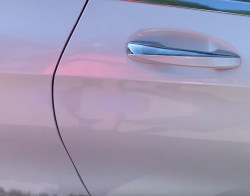— Mercedes-Benz power closing doors, also called soft-close doors, are the focus of a lawsuit filed by plaintiff Richard J. Kastigar, Jr., who is chief deputy of the Pima County Sheriff Department in Arizona, and who lost part of his thumb in a Mercedes door.
The plaintiff and his wife returned home in their 2020 Mercedes-Benz GLE 450 SUV on October 8, 2021, a year after he first leased the vehicle.
After pulling into the garage, Mrs. Kastigar exited the vehicle and entered the house while Mr. Kastigar exited the vehicle with his back to the car. The lawsuit says with his right hand behind his back near the B-pillar and his right thumb on the inside door column, the door suddenly pulled shut on his thumb.
Mr. Kastigar says he felt his right thumb being crushed by the door and watched as the door severed the upper half of his thumb.
An emergency room physician "attempted to reconstruct the distal portion of Plaintiff’s right thumb. Sadly, by that time it was too late to restore Mr. Kastigar’s thumb to its pre-injury condition."
The lawsuit says the plaintiff underwent emergency surgery "to remove the protruding distal phalanx bone and surrounding soft tissue and nerves."
According to the plaintiff, he will lose at least $500,000 in wages due to his thumb injury.
The lawsuit alleges that because he lost part of his thumb:
"A once proud and independent man who protects the public from harm now relies on his wife to assist him with going to the bathroom, showering, brushing his teeth, getting dressed and buttoning his shirt. He has great difficulties holding a pen, feeding himself, tying his own shoes, using tools and assisting around the house with chores such as laundry and washing dishes." — Mercedes soft-close door lawsuit
According to the lawsuit, the door reaches an outer or secondary latch position and engages with the striker located on the center pillar. An electric motor then automatically pulls the door firmly closed with barely any noise.
The plaintiff says the Mercedes soft-close doors cannot be disabled by dealer technicians. Instead, the lawsuit says a specialized trained technician must disable the power closing function.
Mercedes Soft-Close Doors Allegedly Need Sensors
The Mercedes soft-close doors apparently work as designed, but the lawsuit alleges the systems lack safeguards such as sensors to detect if fingers or hands are going to be smashed.
The lawsuit also claims Mercedes should not be marketing or selling any vehicles equipped with soft-close doors but not equipped with sensors to detect objects in the way.
The power closing door lawsuit claims the feature is "nothing short of a modern-day guillotine," and Mercedes allegedly fails to warn customers about the dangers.
The owner's manual says:
Power Closing Function: "If you push the door into the lock to the first detent position, the power closing function will automatically pull the door into the lock."
However, the plaintiff says Mercedes doesn't warn about the true dangers associated with the soft-close doors.
Mercedes-Benz isn't the only automaker to be sued over soft-close doors, as Jaguar and BMW have also faced similar claims about a lack of sensors.
In the case against BMW, the judge dismissed the lawsuit by saying humans have been slamming their fingers in car doors since doors were invented and BMW's doors are no exception.
The Mercedes soft-close door lawsuit was filed in the U.S. District Court for the District of Arizona: Richard J. Kastigar, Jr., et al., v. Mercedes-Benz USA, LLC., et al.
The plaintiff is represented by A. Cohen Law Firm, P.C.

